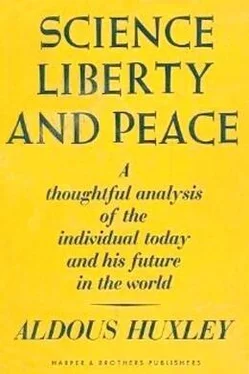The storage of the potentialities of power is almost as important as the production of power. One of the most urgent tasks before applied science is the development of some portable source of power to replace petroleum—a most undesirable fuel from the political point of view, since deposits of it are rare and unevenly distributed over the earth’s surface, thus constituting natural monopolies which, when in the hands of strong nations, are used to increase their strength at the expense of their neighbours and, when possessed by weak ones, are coveted by the strong and constitute almost irresistible temptations to imperialism and war. From the political and human point of view, the most desirable substitute for petroleum would be an efficient battery for storing the electric power produced by water, wind or the sun. Further research into atomic structure may perhaps suggest new methods for the construction of such a battery.
Meanwhile it is possible that means may be devised, within the next few years, for applying atomic energy to the purposes of peace, as it is now being applied to those of war. Would not this technological development solve the whole problem of power for industry and transportation? The answer to this question may turn out to be simultaneously affirmative and negative. The problems of power may indeed be solved—but solved in the wrong way, by which I mean in a way favourable to centralization and the ruling minority, not for the benefit of individuals and co–operative, self–governing groups. If the raw material of atomic energy must be sought in radioactive deposits, occurring sporadically, here and there, over the earth’s surface, then we have natural monopoly with all its undesirable political consequences, all its temptations to power politics, war, imperialistic aggression and exploitation. But of course it is always possible that other methods of releasing atomic energy may be discovered—methods that will not involve the use of uranium. In this case there will be no natural monopoly. But the process of releasing atomic energy will always be a very difficult and complicated affair, to be accomplished only on the largest scale and in the most elaborately equipped factories. Furthermore, whatever political agreements may be made, the fact that atomic energy possesses unique destructive potentialities will always constitute a temptation to the boy–gangster who lurks within every patriotic nationalist. And even if a world government should be set up within a fairly short space of time, this will not necessarily guarantee peace. The Pax Romana was a very uneasy affair, troubled at almost every imperial death by civil strife over the question of succession. So long as the lust for power persists as a human trait—and in persons of a certain kind of physique and temperament this lust is overmasteringly strong—no political arrangement, however well contrived, can guarantee peace. For such men the instruments of violence are as fearfully tempting as are, to others, the bodies of women. Of all instruments of violence, those powered by atomic energy are the most decisively destructive; and for power lovers, even under a system of world government, the temptation to resort to these all too simple and effective means for gratifying their lust will be great indeed. In view of all this, we must conclude that atomic energy is, and for a long time is likely to remain, a source of industrial power that is, politically and humanly speaking, in the highest degree undesirable.
It is not necessary in this place, nor am I competent, to enter any further into the hypothetical policy of internationally organized science. If that policy is to make a real contribution toward the maintenance of peace and the spread of political and personal liberty, it must be patterned throughout along the decentralist lines laid down in the preceding discussion of the two basic problems of food and power. Will scientists and technicians collaborate to formulate and pursue some such policy as that which has been adumbrated here? Or will they permit themselves, as they have done only too often in the past, to become the conscious or unconscious instruments of militarists, imperialists and a ruling oligarchy of capitalistic or governmental bosses? Time alone will show. Meanwhile, it is to be hoped that all concerned will carefully consider a suggestion made by Dr. Gene Weltfish in the September, 1945, issue of the Scientific Monthly . Before embarking upon practice, all physicians swear a professional oath—the oath of Hippocrates—that they will not take improper advantage of their position, but always remember their responsibilities toward suffering humanity. Technicians and scientists, proposes Dr. Weltfish, should take a similar oath in some such words as the following: ‘I pledge myself that I will use my knowledge for the good of humanity and against the destructive forces of the world and the ruthless intent of men; and that I will work together with my fellow scientists of whatever nation, creed or colour for these our common ends.’
THE END



![Олдос Хаксли - О дивный новый мир [Прекрасный новый мир]](/books/11834/oldos-haksli-o-divnyj-novyj-mir-prekrasnyj-novyj-thumb.webp)






